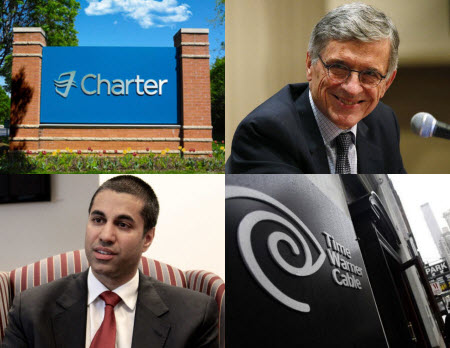FCC Releases Charter-TWC Order
The smarter way to stay on top of the multichannel video marketplace. Sign up below.
You are now subscribed
Your newsletter sign-up was successful

READ MORE:Complete 'MCN' coverage of the Charter-Time Warner Cable merger.
The FCC has released the order in the Charter-Time Warner Cable merger and it clearly did not sit well with commissioner Ajit Pai.
In his dissenting statement, Pai said the FCC majority appeared to only reluctantly approve, and spent more time knocking it than anything else.
Indeed, the almost 500-paragraph order does list the reasons the deal is a threat to competition, explaining that is why the conditions are necessary and why it will have to closely monitor the new company to make sure it does not try to evade the conditions.
RELATED:Plepler—Charter-TWC Deal Presents Opportunities for HBO Now
The admonitory tone of the item could be a way to make the approval of the deal more palatable to those who strongly opposed approval of the merger in any form, as well as to justify the conditions and their length.
"We conclude that the transaction will materially alter the Applicants’ incentives and abilities in ways that are potentially harmful to the public interest," the FCC said. "First, New Charter’s increased broadband footprint and desire to protect its video profits will increase incentives to impose data caps and usage-based prices in order to make watching online video more expensive, and in particular more expensive than subscribing to a traditional pay-TV bundle. Second, New Charter’s larger number of broadband subscribers will increase its incentive and ability to raise prices on companies—including online video distributors—that interconnect with New Charter’s network to deliver Internet traffic that consumers want. Third, the transaction will likely increase New Charter’s incentive and ability to use its leverage over programmers to extract contractual terms that will frustrate the programmers’ abilities to license content for online distribution. In doing so, New Charter will foreclose online video distributors from content that allows them to be more vibrant competitors to cable operators."
The smarter way to stay on top of the multichannel video marketplace. Sign up below.
RELATED:Netflix Good With Charter-TWC Deal Conditions
The FCC spelled out the conditions:
"First, for seven years, we prohibit New Charter from imposing data caps or charging usage-based pricing for its residential broadband service. This condition ensures that New Charter will continue Charter’s past pricing practices and protects subscribers from paying fees designed to make online video consumption more expensive leading subscribers to stick with a traditional pay-TV bundle.
"Second, to prevent New Charter from raising prices on companies that deliver Internet traffic—including online video traffic—requested by its broadband subscribers, we condition the transaction on a modified version of the Applicants’ settlement-free interconnection commitment. The Applicants committed to interconnect with qualifying companies for free. Our modifications will ensure that companies may more easily qualify for free interconnection and that they may increase their traffic and expand their services at a greater rate before needing to pay to deliver content to New Charter’s subscribers.
"Third, because New Charter will have an increased incentive to use its greater leverage over programmers to frustrate online video competition, Commission staff worked in close coordination with the Department of Justice Antitrust Division to prohibit, for seven years, New Charter from entering or enforcing contractual terms that prevent or penalize programmers from distributing content online.
"Fourth, the proposed transaction will likely result in a number of modest efficiencies and public benefits, including lower overhead and programming costs and increased enterprise competition. We intend the conditions we impose today to permit the transaction’s likely efficiencies and benefits to proceed while mitigating the likely harms. We acknowledge, however, that conduct remedies may not eliminate all harms and require close monitoring to prevent evasion in ways that cannot be anticipated. We adopt a monitoring system designed to watch for any attempts by New Charter to avoid the letter and spirit of the conditions. We further require New Charter to undertake a build out program that will deploy high-speed broadband to 2 million more homes and a low-income broadband program for eligible households. Taken together, these guaranteed benefits provide confidence that the transaction’s public interest benefits will outweigh any harms."
"It is quite clear the Commission’s majority does not believe that the merger of Charter, Time Warner Cable, and Bright House is in the public interest," Pai said. "This Order spends over 100 pages detailing the harms that would allegedly result from the transaction. And when the discussion turns to the merger’s purported benefits, the words “modest” and “minimal” are used over and over again."
Pai called the deal conditions "ideologically inspired extortion," and said it had to end. "In sum, I do not believe that the adoption of this Order is in the interest of the American people. I therefore dissent."
Commissioner Clyburn, in her statement, said she fully supported the conditions, but because she thought there should be more, only concurred in the underlying decision, though that is still a 'yes" vote.
Commissioner Michael O'Rielly said he had voted to approve the underlying item, but to reject some conditions he thought exceeded the FCC's authority.
The final vote was 4-1.
Contributing editor John Eggerton has been an editor and/or writer on media regulation, legislation and policy for over four decades, including covering the FCC, FTC, Congress, the major media trade associations, and the federal courts. In addition to Multichannel News and Broadcasting + Cable, his work has appeared in Radio World, TV Technology, TV Fax, This Week in Consumer Electronics, Variety and the Encyclopedia Britannica.

